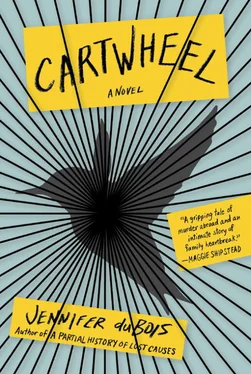At least Andrew could be grateful that he and Maureen had already spoken, and that they had agreed on so much. They had agreed that they would alert the State Department and contact the media; they had agreed that they would start a website and accept donations of frequent flier miles and, if it came to it, money. They had agreed to remortgage the house, though they had also agreed that they would most likely need to sell it eventually. (They had been keeping it ostensibly to minimize the disruptions in the lives of Anna and Lily, but for reasons both dreadful and benign this was a ship that had, decidedly, sailed.) They had also agreed that only one of them should go to Buenos Aires first: They both wanted to be there, of course, but it was wise to plan for the long term, and if they switched off weeks, Lily could always have a visitor. Andrew had insisted on going first because he knew that if Maureen did, Lily would want her to stay and stay. Maureen, in an act of extreme kindness, had agreed. The unspoken concession on Andrew’s part had been bringing Anna along. It was these sorts of small, practical generosities that had made the final eight benumbing years of their marriage endurable—when they’d soldiered on, producing Lily and Anna in rapid succession, insisting on each other’s survival. Their marriage had run on the inertia that keeps a moving object in motion, at least until the girls were in school. Then came a sense of sputtering, of hopeless decline, and Andrew had had the image—inapt, but recurring and intrusive—of a headless chicken that runs around for a bit before falling down dead.
Andrew swallowed and tried to smile at Anna. “I think we can spring for it just this once, Old Sport,” he said.
At the hotel, Anna took a shower and went off to run with wet hair. Andrew lay on the bed for seven minutes—he counted—and then sat up, opened his laptop, and began looking again through the photos Lily had sent him before all of this began. She’d taken a lot of pictures of fruit: guavas and bananas and weird melons that looked like hedgehogs. There was a picture of Lily standing in front of a church, and Andrew grimaced again at what she was wearing: a low-cut top, one of those cheap, flimsy things she bought at deep-discount clothes warehouses. All the women around her were dressed conservatively. Had she really not noticed? There was also a picture of Lily and the dead girl, Katy, who was as strikingly lovely here as everywhere—she was extraordinary, really, with ash blond hair and strangely depthless eyes. Her beauty was, of course, terrible news. (“This does not help,” Peter Sulzicki had said, tapping Katy’s face in the photograph. “This does not help at all.”) In the picture, Katy and Lily are laughing, drinking beers at a bar somewhere. They look friendly enough. But Andrew cringed when he thought of Lily’s emails and the things she’d written in them about Katy. “Katy thinks that punning is the highest form of humor.” “Everything about Katy is perfectly average, except her teeth.” “Can we talk about her name? Katy Kellers. What were her parents thinking? Was their dearest ambition that their daughter grow up to be a local TV anchorwoman?” The emails were already out there, of course—they’d been published in the local tabloids and helpfully reposted by what seemed like every blogger in the universe—and Andrew knew how bad they sounded. The dismissiveness and condescension wasn’t even the worst of it—the worst was the implied assertion that Lily must not be average if she could muster such disdain for the average. The irony of that was that Lily was indeed average, more or less—bright, of course, and curious, and a bit reckless, and possessed of an annoying tendency to try to bring philosophy to bear on daily life in rather purist and militant ways—but all that this added up to, essentially, was average for a decent young student at a decent New England college. Lily bounced through life with the sense she was discovering everything that existed for the first time—Nietzsche, or sex, or the possibility of a godless universe, or the entire continent of South America—and all that was fine , of course: She was twenty-one; she was allowed. It was maddening, then, the narrative that Lily somehow deviated so egregiously from the norm. She was typical, she was aggressively typical—all the more so if she didn’t quite know it yet.
In one photo, Lily licks salt from her hand; in the next, she sucks on a lime. In another, she has climbed a hill somewhere and is making a gesture of mock victory. The next picture is of a three-legged dog. The next is a terrible shot of the dome of a cathedral, from straight below: White rays lace through the architecture; the cupola is ablaze with light. How could a twenty-one-year-old girl not take this photo? All of these photos. Andrew’s heart broke on their banality.
He closed the computer and thought about what he needed to do next. Maureen would be calling soon. Tomorrow was the first meeting with the new lawyers. And at some point, Andrew wanted to go talk to Lily’s rich friend—Andrew recoiled from his own use of the term “friend” here. It was a euphemism borrowed from Maureen: She had insisted on introducing one of Lily’s unfortunate college boyfriends as her “friend,” over and over, until Lily finally flounced dramatically and said, right in front of a dinner party, “Mom, he’s my lover .” The guy here was named Sebastien LeCompte, which sounded to Andrew like the name of a high-end suit store—though he knew he shouldn’t complain: If the name hadn’t been exotic Lily would never have written it out in its entirety. And silly name or not, Sebastien LeCompte was the single most important person in the universe: He was the person Lily had been with on the night Katy Kellers was killed. Andrew needed to know exactly what he was planning on saying about that. Sebastien LeCompte himself had not been arrested—though perhaps he might still be, of course—and Maureen and Andrew careened around this fact obsessively, with little sense of how they should regard it. In various lights, it could appear promising (if Lily had been with this guy and the police weren’t even bothering to arrest him, perhaps they knew that the case was weak?) or terrifying (what might have he told the cops in order to avoid arrest?) or patently good (no sense in two innocent kids being thrown in jail?) or baldly unfair (if one innocent kid had to be thrown in jail, why the hell wasn’t it this asshole instead of their daughter?). Andrew needed the answers to these questions, and he needed them as soon as possible, and he was going to go find Sebastien LeCompte and get them.
Andrew did not plan on mentioning any of this to Peter Sulzicki, the lawyer—although, to be technical, the only people he had specifically prohibited Andrew from contacting were the Kellerses. On this point, Peter Sulzicki had been emphatic. This was painful for Andrew, because he understood what the Kellerses were going through; he knew that losing a child was the single worst experience that life had to offer. Andrew did not know, of course, which way was harder—whether it was worse to lose a child when she was far away and you were sleeping, or when you were cupping her tiny head and feeling her delicate pulse go quiet. Not that Andrew had ever given up on working through the hierarchies of pain, teasing out the taxonomies of grief; he scorned people who were untouched by death, and he loathed people who shared experiences about their dying parents when he spoke of Janie ( Who cares ? he wanted to shout. This is the way of things! ). The only people he truly respected were the ones whose pain was objectively, empirically, worse than his. There was a man in Connecticut, for example, who’d lost his entire family—wife and two daughters—in a home invasion. They were raped and set on fire. Andrew felt sorry for this man.
Читать дальше












